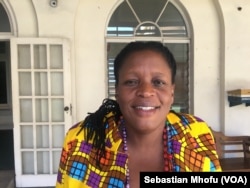Zimbabwe's parliament has amended the country's constitution to empower the president to handpick the southern African nation's top judges.
Plans to give President Robert Mugabe such power started early this year when the then-chief justice left the bench after reaching the age of retirement.
Mugabe's ruling ZANU-PF immediately petitioned the courts to halt public interviews to appoint the next top judge until the constitution had been changed to allow Mugabe to choose the new jurist.
The application failed, but ZANU-PF introduced a bill proposing the amendment to ensure the president chooses a chief justice, along with the deputy and the head of the high court, known in Zimbabwe as the Judge President.
Priscilla Misihairabwi, an opposition member of parliament who had campaigned against the constitutional amendment, says the move reverses what Zimbabweans voted for in 2013.
"Why do we take away the will of the people, something that was voted in by millions and millions of Zimbabweans?" Misihairabwi said. "The second thing is that it goes against [the] very basic tenet of democracy. One of the things that democracy demands is that you have to have separation of power. You cannot create a situation where you put all the powers in one individual. What this thing has done is the second thing to the executive presidency. We had the executive presidency, now we have created a bigger creature than the executive presidency."
ZANU-PF parliament member Ziyambi Ziyambi says he sees nothing wrong with the new law that awaits Mugabe's signature.
"I think it is good for our democracy," Ziyambi said. "We discovered a lacuna [gap] in our law, something needed to be rectified and the bill was tabled in parliament. We did all the due processes. ... It was discovered that there were impractical things which were within that constitution. For instance, the outgoing chief justice will interview his successor. It is something which is not attainable. And besides, even if you look at most jurisdictions, even in Europe, they do not hold public interviews for the chief justice. For other judges, yes."
The opposition has criticized the amendment as a direct reversal of the will of the people. The 2013 constitution passed by popular referendum limited presidential powers, including removing Mugabe's ability to handpick judges.
Observers say the amendment could have implications for the 2018 elections, as the Supreme Court would decide on who rules on any poll disputes.






